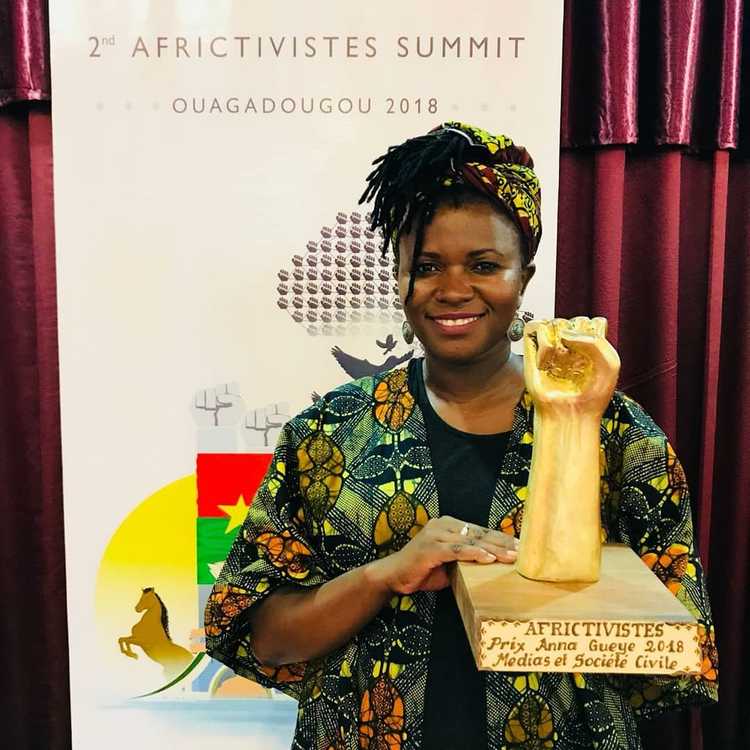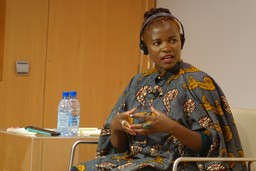Rosebell Kagumire, the Ugandan winner of the 2018 AfricTivistes Prize
Rosebell Kagumire is a feminist writer, communication specialist, and activist. She is the curator and editor of African Feminism, an online platform that brings together feminist writers and activists across Africa.
Rosebell is a council member at the Nalafem Collective where in 2022 co-authored a book I am Nala with her writing on the struggle for reproductive justice. She has co-edited a book: Challenging Patriarchy: The Role of Patriarchy in the Roll-Back of Democracy in East and Horn of Africa. Rosebell sits on the advisory board of the Centre for Feminist Foreign Policy and was recognized by Avance Media as one of the 100 Most Influential Women in Africa for the 2021 edition.
She has expertise in the media, gender, peace and conflict, social responsibility, active citizenship, women’s liberation, migrants’ rights, and social justice. Rosebell was awarded the 2018 Anna Gueye Award for her contributions to digital democracy, justice and equality on the African continent by Africtivistes, a network of African democracy activists.
The World Economic Forum recognized Rosebell as one of the Young Global Leaders under 40. She holds a Masters degree in Media, Peace, and Conflict Studies from the UN-mandated University of Peace in Costa Rica. She has done short-term studies in nonviolent conflict at the Fletcher School and Global Leadership and Public Policy at the Harvard Kennedy School. Her undergraduate degree is in Mass Communication from Makerere University, Uganda.
AfricTivistes: Ms. Kagumire, as a feminist writer and activist, can you tell us what triggered your activism?
Rosebell Kagumire: Getting into activism is a process, it is really a collective doing. It starts with someone providing room for me to hold opinions as a child, and space to speak right from home at an early age. I then studied journalism and went ahead to practice which opened my eyes in my early 20s to different lived realities in my country, the structures that uphold who makes it and who doesn’t. I also learned the power of the media, the power of telling a story can do to bring to light people’s realities and sometimes change. Freedom of expression and threats to it showed me why it is important to speak out and organise beyond self and private spaces. It is within the media that I also felt that just telling the story wasn’t going to be enough for me, standing with people and actively working together to find ways to improve our conditions or holding those failing the people accountable daily is important.
Did your activism cost you anything in life?
Taking stands often alienates some people from you but so does it bring a new community. Sometimes seeking work was difficult because we operate in a culture of different economic and political interests co-opting spaces and mainstreamed complacency of not wanting to shake the table. Sometimes I have received that ‘she’s too much’ treatment when seeking opportunities but it can only galvanise me to be that ‘too much’ because we need to be too much for the systems to change. I have faced some threats that I have managed to mitigate with help. But often what no one prepares you for is the impact on mental health this work brings and I have had to step back from some work when I reach a moment that I feel I am unable to sustain.
What are the most important feminist demands in Africa?
Africans find themselves at a poignant point where we have barely decolonised what colonisers left us, from political-economic institutions and models to social norms and social harms. As a result, we see a state still committed to the continuation of colonial violence denying civil liberties, economic disenfranchisement, conducting sham elections against the will of the people, and playing window-dressing instead of addressing the inequality that decades of colonisation imposed on African people and the specific ways gendered power was constructed away from communities to men and patriarchy in most spheres of our lives.
We still have decision-making for this continent largely in the hands of few ill-equipped, violent power holders. Ill-equipped to think and act for the continent at a time when global imperial powers are coming back renewed scramble for the rest of our labour and resources. Focus should be on defeating militarism – where we spend more budgets on arms than education and our own health infrastracture- playing into the hands of global empires that are behind many conflicts on the continent that have displaced millions and made our economies weak.
The most urgent call is to actually establish a politics that is seeking to dismantle the African colonial state as it still is and create space for new imaginations on how we can exist, organise and live as a people. To ensure African people have right to mobility and migrate within the continent outside colonial borders.
The existing lack of ideologies in our politics make it easy to put just a few women in power without addressing the historic power imbalance from home, to the streets to the state houses. The continued amassing of wealth by a few while inequality becomes the norm is unsustainable. The fight to ensure economic justice and economic liberation of both marginalised women and communities as well as liberating our own economies from neo-liberal frameworks that keep us in the cycles of debt and poverty. Addressing environmental and ecological questions in the face climate crisis is a major demand that goes to our own governance crisis and imperialism.
We must deconstruct social norms that punish the poor and gender-diverse people, allow gender diversity and protect rights of all Africans from dehumanization particularly those pushed to the margins of soceity and denied a voice. Creating policies and institutions that uphold rights of women, children, ethnic and religious minorities, gender diverse people to live with dignity, addressing mass sexual violence against women and children.
As an active African citizen, what is your view on the state of democracy in African countries?
Similar to what I speak about above, we have never had democracy in colonial constructed states. While we had some moments of hope and progress on some issues and in some countries, the state of democracy remains, ever so miserable today. The hijacking of liberation ethos and ideologies post-independence to the erasure of women’s role and contributions to the liberation of the continent from colonial forces is still an issue. The position of women most countries remains problem with many parliaments debating the bodies and safety of women to their detriment.
Power and resources are still in the hands of few – often men – who use these community and state resources to deny any semblance of will of the people, as a result, we see economic growth recorded but more inequality and people stuck in poverty cycles. So economic growth is for who?
In most countries we see young people below the age of 25 being a majority and unless some major shifts happen in the way governance is done, we should brace ourselves for periods of contestation, and protests – all necessary to dislodge power currently in the hands of old men that have enriched themselves at the expense of the communities and country. We have already seen the surge in pan-African feminist organising and young people in different countries protesting the state of affairs and providing what a different path could look like.
We have seen many countries take gender equality and inclusiveness to mean adding more numbers without a shift in power. It is not simply enough to represent a group, what power that group does gain from the few representatives, we have is not much to account for. The structure of the state and conduct of those with power in African states cannot deliver democracy and has almost never. renewed militarism and militarisation of state institutions and responses to agitation is threatening our security and future.
We see more rulers than leaders outsourcing the brutal hold onto countries through military and economic deals with countries with military and imperial power to ensure nothing counts out of our elections and nation-building processes. But all marginalised people, from the young to women to gender-diverse people have always fought back to get their place in society and this struggle will continue particularly at this time we see many countries slipping back on promises of equality and respect for the will of the people.
In 2018, during the third AfricTivistes summit in Ouagadougou you were awarded the Anna Gueye prize for your citizen engagement, what does this recognition mean to you?
I was honoured to receive an award in commemoration of a person I deeply admired and one of the great pioneers of online organizing and storytelling. We often do unrecognized and thankless work, the prize was validation of my work as well as a reminder to keep building on what fellow activists have done in life and death. It is important in this day when online spaces are at the centre of many positive shifts in society but also bringing on new threats to marginalised people. It renewed my spirit to keep going.
What would you advise women who want to make equity , a reality in Africa?
I would actually say young Africans no matter their gender, ethnicity and sexuality, it is important to invest in knowledge – our knowledge of the past not just colonised narratives that both mass media and our education systems still uphold. Understanding our own ethos and ways of guaranteeing dignity for all and how our existence is interconnected. We must continue to seek knowledge, especially at such time of great disinformation. Without the quest for knowledge, our energy is wasted on narrow struggles and running around in circles. Audre Lorde said ‘there is no such a thing as a single-issue struggle because we do not live single-issue lives’ so the fight is for all Africans to be seen and treated as equal and whole in our multiple identities. And Winnie Madikizela-Mandela famously said “I am not the sort of person to carry beautiful flowers and be an ornament to everyone.”
We must refuse to be used as ornaments by the powerful, refuse to be merely seen and not heard, and refuse representations and notions that deny you space, power and dignity, right from home to workplaces and to the streets and other corridors of power.
Suivre sur Rosebell Kagumire :
By Ndeye Fatou Diouf, Digital Content Manager of AfricTivistes











![[Togo] AfricTivistes protests against Togo’s constitutional change!](/static/a82ede1de723a3762a93195203dc0156/fce2a/1.png)
![[Mali] AfricTivistes calls on the junta to respect fundamental rights!](/static/bd7efaf062b64313cb28d63c1830b96a/9e635/WhatsApp-Image-2024-04-17-at-13.58.19.jpg)


![[Congo]Africtivistes demands the immediate and unconditional release of all activists](/static/503b1823ba8a254ad4ebd649fcf7d38c/fce2a/aliousane.png)

![[Senegal] AfricTivistes and five other organisations demand light be shed on assaullt of journalist Maimouna Ndour Faye](/static/15e44ab239406e91d8f4a5d451f5d71c/9e635/WhatsApp-Image-2024-03-02-at-14.41.24-2.jpg)
